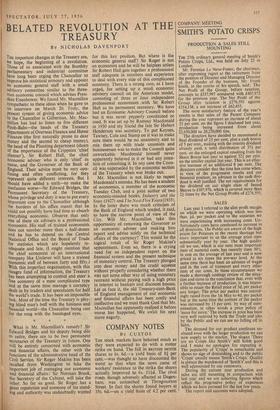TREASURY
By NICHOLAS DAVENPORT
Tutu: important changes at the Treasury are, We hope, the beginning of a revolution. Those of us associated with the Boothby Parliamentary and industrial committee have long been urging the Chancellor to Improve his statistical armoury and appoint an economic general staff with a small advisory committee similar to the three- man economic council which advises Presi- dent Eisenhower. We found Mr. Macmillan sYmpathetic to these ideas when he gave us an interview on March 20. Truly, the Present system of giving economic advice to the Chancellor is Gilbertian. Mr. Mac- millan has had to listen to five different Pooh-Bahs--the heads of the Treasury departments of Overseas Finance and Home Finance (the first naturally prone to dear Money and the second to cheap money), the head of the Planning department (shorn of the importance of the Crippsian 'chief Planner), Sir Robert Hall, the chief economic adviser who is only 'chief' in ',lame, and the Governor of the Bank of
ngland. Their advice must be very con- fusing and often conflicting, for they represent quite different interests. But I Should have added a sixth—to make the confusion worse—Sir Edward Bridges, the Permanent Secretary of the Treasury, ‘,.vhose privilege and duty it was to put every Important case to the Chancellor although the burdens of his office meant that he Could not possibly have had time to absorb everything economic. Observe that only one of these six advisers is a professional economist. His staff of trained economists does not number more than a half-dozen and he has to depend on the Central Statistical Office and the Board of Trade for statistics which are hopelessly in- adequate and late. (I might mention that the chief economist of an international company like Unilever will have a trained economic staff of between forty and fifty.) With this imperfect organisation, with this Meagre fund of information, the Treasury has been attempting to control and steer a free economy of a most complicated type and at the same time manage a currency dealt in by traders and speculators for half the world's trade. It has been an impossible task. Most of the time the Treasury is play- ing blind man's buff with the business and financial world—the Chancellor being cast for the mug with the bandaged eyes.
What is Mr. Macmillan's remedy? Sir Edward Bridges and his deputy being due to retire, there are to be two permanent secretaries of the Treasury in future. One Will be entirely concerned with economic and financial affairs, the other with the Junctions of the administrative head of the Civil Service. Sir Roger Makins has been recalled from Washington to take the important job of managing our economic and financial affairs: Sir Norman Brook, the Secretary of the Cabinet, will take the other. So far so good. Sir Roger has a peat reputation and someone of his stand- ing and authority was undoubtedly wanted
for this key position. But where is the economic general staff? Sir Roger is not an economist and he will be helpless unless Sir Robert Hall gets together a professional staff adequate in numbers and experience to deal with every side of this complicated economy. There is a strong case, as I have urged, for setting up a small economic advisory council on the American model, consisting of three or four independent professional economists with Sir Robert Hall as its permanent secretary. We have had an Economic Advisory Council before but it was never prpperly constituted or used. It was set up by Ramsay Macdonald in 1930 and my friend the late Sir Hubert Henderson was secretary. To put Keynes, Tawney, Cole and Stamp on it was to make sure there would be no unanimity and to mix them up with trade unionists and businessmen was to make the Council quite unworkable. Macdonald himself never apparently believed in it or had any inten- tion of consulting it. In any case the Coun- cil was superseded by the economic section of the Treasury when war broke out.
Mr. Macmillan is not likely to repeat Macdonald's mistake. He has been a student of economics, a member of the economic Tuesday Club, and a joint author of two economic-minded books, Industry and the State (1927) and The Next Five Years (1935). In the latter there was much criticism of the Bank of England which tended, it said, to have the narrow point of view of the City. Will Mr. Macmillan take this opportunity of removing the Governor as an economic adviser and making him report and advise solely on the technical affairs of the currency? This would be the logical result of Sir Roger Makins s appointment. Even so, there is a crying need for an independent report on the financial system and the present technique of monetary control. The Treasury plunged into dear money and the credit squeeze without properly considering whether there was not some other way of using monetary restraint without paying such a high price in interest to bankers and discount houses. Let us face it, the old Treasury-cum-Bank of England management of our economic and financial affairs has been costly and ineffective and we must thank God that Mr. Macmillan has apparently realksed it before worse has happened. We await his next move eagerly.


































 Previous page
Previous page